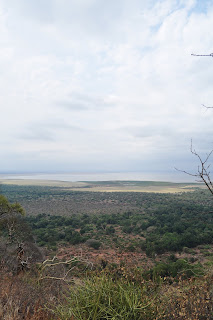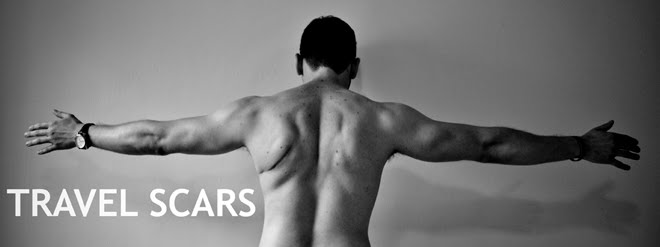On the fourth day of our safari, we went to Lake Manyara National Park: a beautiful park centered by the aforementioned lake and its hundreds of thousands of birds.


Unfortunately, we visited Lake Manyara after the Serengeti and Ngorongoro crater: the lake's lack of large carnivores and much smaller mammal diversity left something to be desired.


The lack of excitement during the day was more than made up for in the evening by two events that I will never forget for the rest of my life.
On the drive to our campsite from lake Manyara, we passed a badly damaged car crumbled at the side of the road. A passenger had been flung from the vehicle when the driver lost control of the car and he now lay on the opposite side of the road. He had a deep gash above his eye that had covered his shirt and jeans in blood. He was incoherent and was coughing up blood. Luckily a Russian veterinarian who had been in another safari truck was already tending to the man's wounds. We provided whatever medical supplies we had and Jules helped carry the man into a daladala to get him to the nearest hospital.
On the rest of our drive, our driver, Bryan, seemed to be just a little more cautious and drove slower as the rest of us sat quietly, trying to erase the bloody victim's image from our minds. I would like to say it ends there, but it actually gets much, much worse.
We arrived at our campsite and settled down for our post-safari tea and dinner that would follow shortly after. Just before 7 pm, Erik went to the road to listen to some young girls singing by the side of the road. He stayed a few minutes and thought to himself how cute they were. I had heard the singing as well and thought it would be nice dinner music. Erik returned to his seat and just as I was taking my first spoonful of soup, we heard a car swerving and crash and that angelic singing turned into shrill screaming.
Some of the campers and most of the guides and cooks ran out into the road to investigate. It was worse than we could have imagined: a pickup truck driven by an apparent drunk-driver, carrying 15 Maasai women had lost control, flipped and thrown all the passengers into the air.
Thankfully none of the children: the son of the driver who was in the front seat, nor any of the singing little girls were injured. What had happened however, was that there were bloodied, injured people lying everywhere; relatives screaming for their loved-ones and absolute chaos unfolding in almost total darkness.
At our campsite, we luckily had a group of 2 med-students and 2 doctors from Holland who were going to tend for the wounded. Erik, using his skills he had acquired as a fire-fighter, set up a triage station for the wounded and instructed the locals who spoke some English to keep people away from the flipped truck, which had started leaking fuel onto the road. Jules went and collected old clothing from the remaining campers to make tourniquets for the bleeding wounds. I raced to find any medical supplies and light sources that could help the situation.
The first victim evaluated by the doctors had already succumbed to her wounds and was already dead. The other critically injured victims were ushered into any vehicles available to take them to the nearest hospital. All attempts to call the police resulted in dial tones.
911 does not exist in Africa
At a certain point, some people tried flipping the car, but any spark produced had the potential for explosive repercussions due to the fuel leak. Erik later assured everyone that because the truck was diesel there was no potential for explosion but we left it as is just in case.
After the critically injured were already on their way to the nearest trauma center (80km away in Arusha), we continued to sift through the victims. As the doctors made sure all those in need were being tended to, I found vehicles to bring the less critically wounded to the hospital, filled them appropriately and then searched through the woods on both sides of the road to make sure there were no unseen or missed victims. As the accident was being gradually cleared up, the realization of what we were involved with was growing in everyone's consciousness.
The car had now been flipped and all the injured were on their way to the hospital and we returned to our campsite with a heaviness that no one would wish on another. We had little appetite and even less to talk about. We made sure we were all okay, mentally speaking, and when Jules and Katy went to bed, Erik and I sipped our warm, anti-climactic, safari celebrating beers and discussed the events that had just transpired. The strangest thing is that both he and I admitted that we were not surprised when we heard the second accident.
We finished our beers and went to bed but I couldn't help but wonder about the fate of those critically injured people in crowded, speeding pickups; on dark bumpy roads: the same circumstances that led to their current situation, only this time they are on their way to the hospital, not the safety of their own homes.
Many thanks and much love to everyone that did all they could to help: to the 4 Dutch docs and med students; to Erik, for his quick thinking and levelheadedness when everyone else was panicking. To Jules, her concern and unwavering selflessness was humbling. And to all other campers, Tanzanians and others who helped prevent this tragedy from becoming worse than it already was.
Our last and final national park was Tarangire, where we saw most of the same animals as Lake Manyara, only this time we had the privilege of seeing everyone's favorite carnivore for one last time: the lion.








After our final day with our four-legged friends we headed back to Arusha with a true understanding of what safari really means: Safari is Swahili for voyage and there is no doubt in my mind that the events that unfolded in those 5 days were anything but.


Seriously crazy stuff James! I'm sorry to hear about your traumatic experience.
ReplyDelete